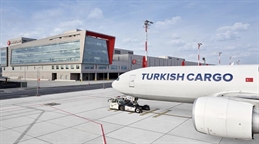
Big Data is here, and Turkish Airlines Cargo is aiming to use it to potentially great effect in its new SmartIST facility.
SmartIST will see the extensive use of new technologies in Turkish Airlines’ new mega cargo facility at Istanbul Airport, the IST of the name. This will make the airline and airport more attractive to customers, and both underpin growth and give the airline flexibility to adapt. The facility also marks a deepening of the airline’s offer to its customers.
“We are focussing much more on our products and services,” Adnan Karaismailoglu, senior vice president of cargo business development and organization Turkish Airlines, said during a recent press tour.
Turkish is starting from an already high level. Its cargo terminal has a footprint of 60,000 square metres and an operations area of 145,000 square metres. It is the biggest single air cargo terminal in Europe and the third-largest in the world and has an annual capacity of 2.2 million tonnes. And there is more to come.
“We are already starting to plan the second phase,” Mustafa Kemal Ozahi, cargo operations planning and projects manager at Turkish Cargo, said before talking of a facility with a footprint of 340,000 square metres and a throughput of four million tons. Turkish hopes for the facility to go on live in 2025, said Ozahi.
What will make this work is not so much the facilities, extensive as they are, but the widespread use of new technologies able to use the huge amounts of data now moving through those systems. “Smart technologies minimize human error,” said Ozahi. “Once we have the data, we are able to manage much more efficiently.”
There are two ways this is being done. One is the 30-crane automatic storage and retrieval system (ASRS). Already they are doing a huge amount of leg work – some 14 freighters worth, according to Ozahi. There are some 17,000 storage positions within the ASRS and 4,000 other storage positions.
More telling is the role and use of RPA. Officially this acronym means robotic process automation, although sometimes it means robotic personal assistant. Turkish has 12 of these, and they have names, but not yet nicknames or a place on the tea rotation.
“They are working in the reservation processes [and] change the reservation of the shipment,” said Ozahi. “They rebook the place and position.”
All this incredible attention to detail is going to be very useful for Turkish Cargo, Four-fifths, or 80%, of its business is transhipment. Moreover, Turkish, like everyone else, is preparing for what is going to be the effective restructuring of the air cargo sector that e-commerce will bring.
“E-commerce is the driving sector of our business,” said Ozahi. “We are now planning a dedicated e-commerce facility with a sortation system,” which will be in the second phase.
Already there are other advantages SmartIST already has led by a cool chain facility with five rooms at different controlled temperatures ranging from 20°C to between -15 and -20°C, a 900-square metre facility for animal shipments and an express goods area.
There is also a valuables area with an inner door and an outer door (only one of which is open at any time), two rooms for export and transit and two vaults. Radioactive matters are stored separately and have a 30-cm thick concrete casing.
What is also interesting is the technologies SmartIST is either not yet using or is still considering. Its focus is very much on digital. RFID once considered the future of the logistics industry, isn’t even on the list.
One of the lesser priorities is drones, which are not seen as bringing much value. “We already track all the movement in the warehouse,” explained Ozahi.
Drones will be used, but sparingly and “mainly outside” for last-mile and e-commerce purposes.
Also for the future are augmented reality and unmanned ground vehicles, according to the airline. “We are currently working on how we use that,” an official said.
By Michael Mackey
Correspondent | Istanbul



